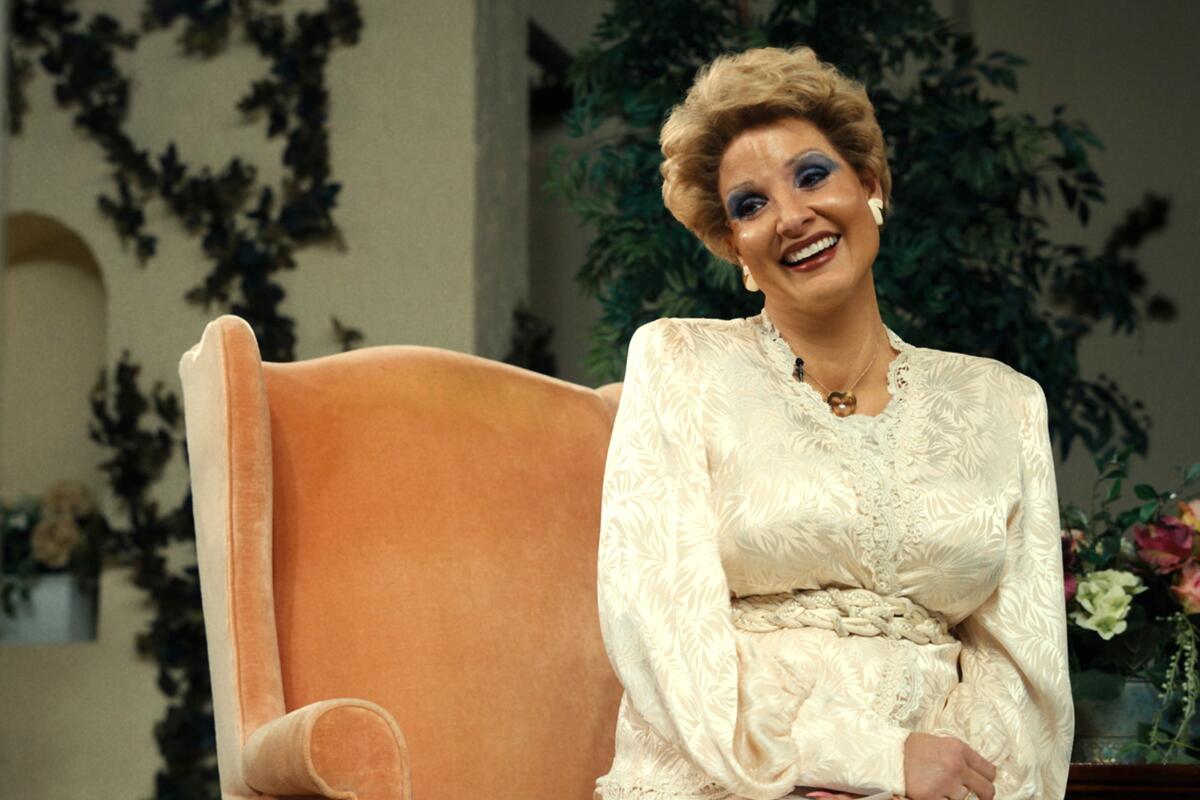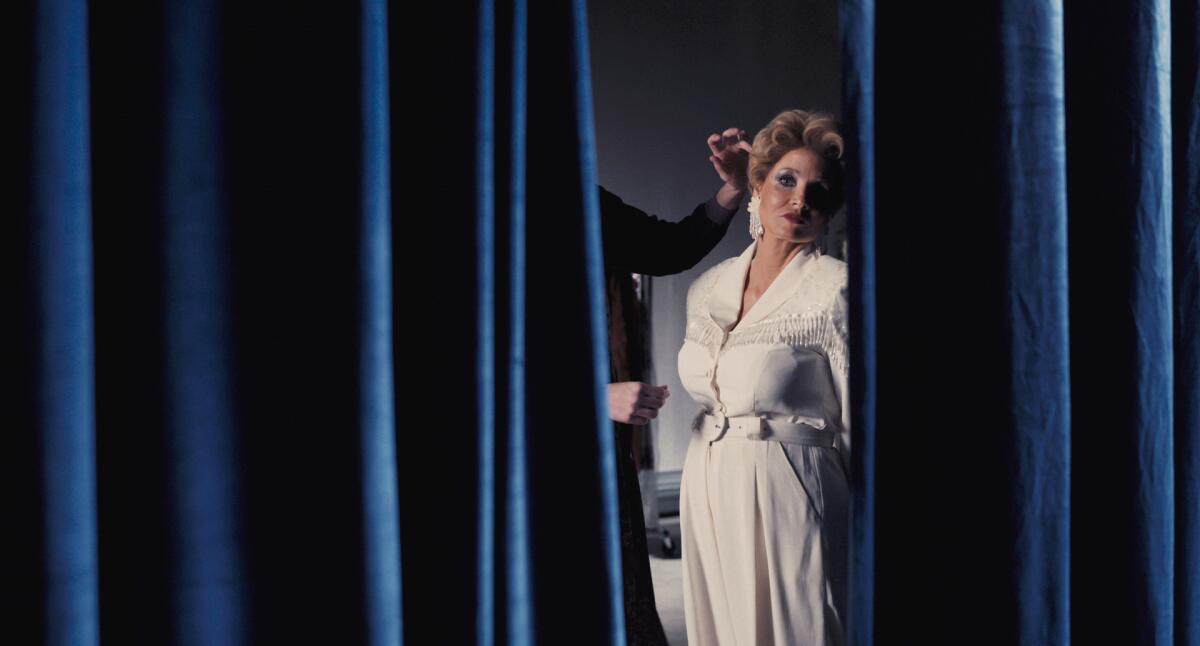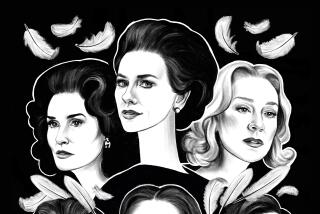Review: Jessica Chastain makes an eye-popping ‘Tammy Faye,’ but this biopic wobbles

The Times is committed to reviewing theatrical film releases during the COVID-19 pandemic. Because moviegoing carries risks during this time, we remind readers to follow health and safety guidelines as outlined by the Centers for Disease Control and Prevention and local health officials.
Near the beginning of “The Eyes of Tammy Faye,” in a small Pentecostal church in 1952 Minnesota, a young Tammy Faye LaValley (Chandler Head) falls to the floor in a violent display of spiritual rapture, writhing and speaking in tongues and soiling her dress. Her strict mother, Rachel (Cherry Jones), who’s playing “Battle Hymn of the Republic” at the piano, is horrified by this spectacle, but the other congregants are delighted. Tammy Faye seems delighted too, as much by her own ingenuity as by the interventions of the Holy Spirit. We’re watching a born crowdpleaser, someone who intuitively grasps that the charismatic Christian tradition she was born into demands — and rewards — a little showmanship.
For the record:
12:08 p.m. Sept. 17, 2021An earlier version of this review misidentified Fenton Bailey, one of the directors of the 2000 documentary “The Eyes of Tammy Faye.”
By the time we see her next, Tammy Faye (now played by a startlingly committed Jessica Chastain) is well on her way to becoming the puppet-waving, mascara-slathered queen of ’70s and ’80s American televangelism known as Tammy Faye Bakker. Along with her husband, Jim Bakker (a super-slick Andrew Garfield), she will forge a multimillion-dollar Christian showbiz empire that will come tumbling down with the revelation of Jim’s myriad sexual and financial scandals. But for all of her husband’s fraudulence and her tacit complicity, she retains a core of innocence and sincerity or so concludes this patchy but glibly watchable movie. For Tammy Faye, it suggests, performing was a natural state of being and, in its way, an expression of love: for God, herself and her audience, and for the cameras bridging the gaps between all three.
That was pretty much the conclusion of Randy Barbato and Fenton Bailey’s barbed but affectionate 2000 documentary, also titled “The Eyes of Tammy Faye.” The identical titles have the unfortunate effect of compounding the new movie’s redundancy, even though it runs nearly an hour longer. Like Barbato and Bailey, the director Michael Showalter (“The Big Sick”) tries to treat Tammy Faye Bakker as a figure worthy of both sympathy and satire, and indeed to make one mode indistinguishable from the other. He wants to reproduce Tammy Faye’s widely mocked aesthetics — from her signature false eyelashes to the gaudy excesses of the Bakkers’ home and broadcasts (nicely approximated by production designer Laura Fox and costume designer Mitchell Travers) — and find in them a source of appreciation as well as ridicule.
Unfortunately, he is often stymied by a pedestrian script by Abe Sylvia ( TV series “Dead to Me” and “Nurse Jackie”) that lurches from one defining life moment to the next and leans heavily on Chastain’s performance to establish a sense of emotional and psychological continuity. It takes a while for that to happen, mainly because this Tammy Faye knows early on exactly who she is and what she’s meant for. Her stubborn sense of God-given purpose, though easy enough to admire, proves initially resistant to any developing sense of interior life. Our first impression of her is all folksy comic mannerisms and laugh-cueing prayers, delivered in a chirpy Betty Boop voice that Chastain gradually invests with an edge of steel.

Tammy Faye’s go-getter determination informs her decision to marry Jim, whose joyous spirit and boundless ambition initially seem of a piece with her own. Both of them run counter to the primly conservative ethos of the Bible college where they first meet: Tammy Faye’s makeup triggers some reflexive slut-shaming while Jim’s sermons on wealth, his insistence that material riches might be a sign of God’s favor, mark him as an early proponent of the prosperity gospel. These scenes — borne out by later glimpses of the Bakkers’ lavish, shag-carpeted digs — couldn’t help but make me flash back on the grave tsk-tsk-ing about prosperity theology I heard at the Baptist church I grew up in. That church, as it happens, was located not too far from the garish Costa Mesa headquarters of the Trinity Broadcasting Network — a station the Bakkers helped build in the early ’70s before being tossed aside by its founders, Paul and Jan Crouch.
That particular episode is absent from the movie, as are a lot of the behind-the-scenes power struggles that might have made for a juicier, more nuanced sense of the Bakkers’ zig-zagging journey to the top of their PTL (Praise the Lord) TV network. Still, the bits we see, interspersed with real and mock TV footage of the era, are often choice. Among the Bakkers’ supporters turned rivals is Pat Robertson (a spot-on Gabriel Olds), whose long-running “The 700 Club” talk show provides an early home for Jim’s preaching and Tammy Faye’s singing and puppeteering. And then there’s the Rev. Jerry Falwell Sr. (Vincent D’Onofrio, all gruff authoritarian menace), who recognizes a formidable foe in Tammy Faye when they politely clash over what Falwell calls America’s “gay cancer.”
The movie mines easy but effective goodwill from Tammy Faye’s defiant support for the LGBTQ community (“America’s for them too”) and her belief that politics and religion shouldn’t mix — all of which makes her a controversially progressive figure by televangelist standards and anticipates her future reclamation as a gay icon. Showalter nicely restages her memorable 1985 televised interview with the gay minister and AIDS activist Steve Pieters (Randy Havens), and Tammy Faye’s allyship is both moving and revealing: The mascara-streaked tears running down her face may look like a put-on, but she gives herself over to her histrionics with such conviction that it becomes impossible to tell where tear-jerking artifice ends and real empathy begins.
The blurring of those lines is the key to Chastain’s performance, which boasts its share of flashily obvious accouterments — she seems to change wigs and accrue layers of makeup with every other scene — but also cleverly subverts them. An actor piling on the prosthetics is nothing new, but the effect here is markedly different from most other showy, prestige-seeking biopic transformations. Because those external layers were, for Tammy Faye Bakker, a crucial component of her most authentic self, Chastain too turns them into a conduit for deeper intimacy with the character. She isn’t lost beneath all that pancake; she’s weirdly found. (She does a fine job of belting out Tammy Faye’s signature tunes too.)

Jim, by contrast, is all grinning, shuffling duplicity, his eyes forever on the camera and his ears forever pricked up for the sound of PTL donor phone calls. Sporting a hucksterish grin and hair almost as big as Chastain’s and drawing out the words “God l-o-o-o-o-o-o-v-e-s you!” a little longer with every refrain, Garfield shows how so many might have fallen for Jim’s amiable bluster, to the point of funding a massive Christian-themed water park, a Disneyland for the devout. But Garfield also betrays a glimmer of terror whose roots the movie only coyly hints at as the Bakkers’ marriage begins to unravel: We catch a sidelong glimpse of the attraction between Jim and a male PTL colleague (Louis Cancelmi), but from there, things implode all too quickly as years’ worth of financial malfeasance tumbles out into the open.
There’s much, much more to the story, some of which the documentary “The Eyes of Tammy Faye” covered but which the fictionalized retelling glosses over. Sam Jaeger turns up briefly as the megachurch builder Roe Messner, but his and Tammy Faye’s later marriage (and subsequent drama) goes uncovered. So too is any deeper analysis of the legacy wrought by the Jim Bakkers and Jerry Falwells of the world, the lasting damage they did by binding mainstream Christianity so closely to the Republican right. (Tammy Faye Bakker died of cancer in 2007, years before a post-incarceration Jim Bakker would reinvent himself as a shill for Donald Trump.)
But perhaps those omissions are fitting. The more alienated she is from the Christian media that spawned her, the more poignant Chastain’s Tammy Faye becomes. We follow her through her failed attempts at a Hollywood reinvention, undertaken with her usual chipper optimism, but also an undertow of melancholy and perhaps a slow-dawning awareness of her own delusion. “Glory, glory, hallelujah,” she sings late in the movie, her voice cracking as she revisits the hymn from that early childhood conversion. It’s as if the scales have finally fallen from her eyes, even if the lashes never would.
‘The Eyes of Tammy Faye’
Rated: PG-13, for sexual content and drug abuse
Running time: 2 hours, 6 minutes
Playing: Starts Sept. 17 in general release
More to Read
Only good movies
Get the Indie Focus newsletter, Mark Olsen's weekly guide to the world of cinema.
You may occasionally receive promotional content from the Los Angeles Times.











